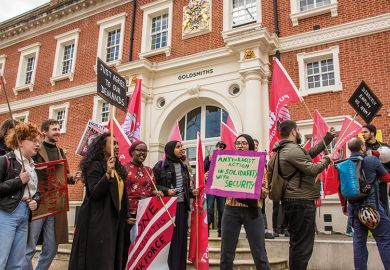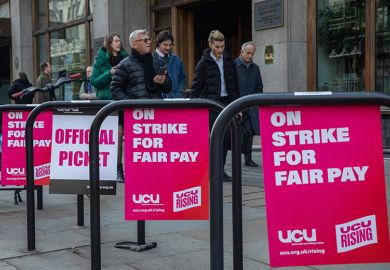Crisis-hit Goldsmiths, University of London will now face continuous strike action at the start of next term, a union has announced.
Members of the University and College Union had originally announced a week-long walkout starting on 23 September in a bid to block redundancies. More than 130 staff were originally set to be axed, but this has now fallen to 97, with affected employees set to lose their jobs within weeks.
On 31 July, UCU said that the strike would now be continuous, after this was backed by 86 per cent of members who took part in a ballot, on a turnout of 62 per cent.
Ten days of strike action have already been taken, ending on 28 June, while a marking boycott is ongoing.
Scholars have warned that the cuts threaten Goldsmiths’ status as a haven for creativity and radicalism.
But Goldsmiths has said it needs to make its finances sustainable, blaming the cuts on the domestic tuition fee freeze, shortfalls in student recruitment and rising costs.
Jo Grady, UCU’s general secretary, said that continuous strike action would be a “last resort”.
“Our members have been pushed to breaking point by Goldsmiths’ insistence on forcing through its brutal redundancy programme,” she said. “Management is in danger of turning Goldsmiths into an academic wasteland by slashing jobs and courses.
“They must think again, cancel the cuts and work with us to safeguard Goldsmiths’ future. If they do not, we will have no choice but to take long-term industrial action from September.”
Goldsmiths’ transformation plan, published in April, warns of an expected £13.1 million shortfall against forecast tuition fee revenues this year – equivalent to 11 per cent of the institution’s entire budget. And it says that Goldsmiths is currently spending 62 per cent of its expenditure on staffing costs, an “unaffordable and unsustainable” level compared with the UK sector average of 43 per cent.
A Goldsmiths spokesperson said that it was “regrettable that our students are facing renewed industrial action, and we will ensure that their learning is supported”.
“Universities across the UK are having to make difficult decisions to navigate unprecedented financial challenges. This is a painful time for us all as we take steps to make our finances sustainable. We consulted staff and unions over our plans but unfortunately this did not result in viable ways forward that would have avoided or reduced the number of redundancies,” the spokesperson said.
“Our plans will ensure that Goldsmiths continues to be a beacon for innovative research and teaching as well as an entry point for students, many of whom are the first in their families to go to university.”
Goldsmiths said that its MA courses in black British literature, queer history and black British history, which were thought to be at risk of closure, “successfully completed our recent programme review and we remain fully committed to delivering these courses”.
Register to continue
Why register?
- Registration is free and only takes a moment
- Once registered, you can read 3 articles a month
- Sign up for our newsletter
Subscribe
Or subscribe for unlimited access to:
- Unlimited access to news, views, insights & reviews
- Digital editions
- Digital access to THE’s university and college rankings analysis
Already registered or a current subscriber? Login








